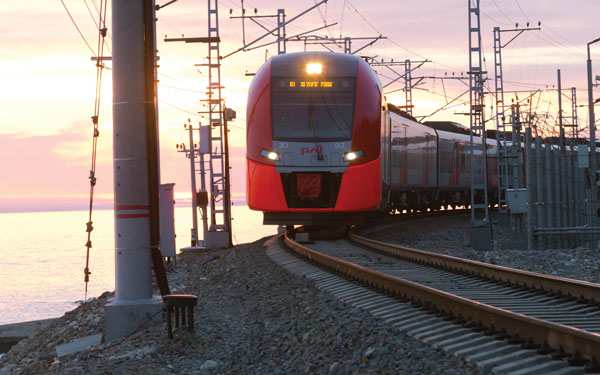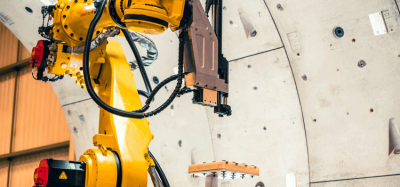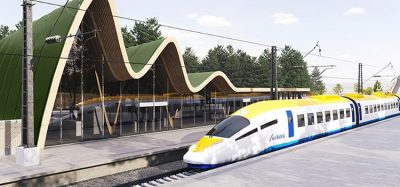Russia: Focusing on project delivery to meet long-term goals
Posted: 4 February 2016 | | No comments yet
The main aim of JSC Russian Railways holding company is to provide a decent and ‘always-available’ service for passengers, plus provide safe mode of transportation on the Russian railway infrastructure. To meet this aim, Senior Vice-President for Innovation Development – Chief Engineer Valentin Gapanovich, explains that various innovative technical and technological inventions have been used…


The railways of Russia hold special strategic importance for the country, providing a unified economic system which ensures the stable operation of industrial enterprises and is the most available type of transport for millions of people in the country.
During the time that has passed since the establishment of JSC Russian Railways, we have managed to achieve significant innovative potential. Technical equipment has significantly improved, equipment for the automation of production processes has got better, plus forecasting of risks and effective management of resources have all proved successful. Furthermore, there are new locomotives on our tracks.
The development of our locomotives was aimed primarily at fleet renewal and increasing their efficiency by improving their technical readiness, understanding the expense of fuel and energy and other resources, plus improving the productivity of locomotive crews. Today we are using unique practices; some that are being performed for the first time in the world, and others that are significantly exceeding worldwide achievements. Among some of these practices include:
- The world’s first gas turbine locomotive
- Developing hardware/software to implement energy saving schedules of passenger and freight trains
- Implementing a system of digital operational and technological communication of railway transport on the basis of the DMR standard
- Establishing a system of railway automation on the basis of integrated appliance of track circuits, satellite navigation, local and distributed digital radio channel
- Improving the decision support system that provides comprehensive resource management, risk management and management of reliability in the life cycle phases of railway transport objects (URRAN).
At the 2014 Sochi Winter Olympic Games, JSC Russian Railways managed to fully demonstrate its innovative potential; the games put focus on us to deliver our wide experience, knowledge and our latest developments. But we wouldn’t have managed to cope with the difficulties that the games brought if we didn’t have a powerful background and a serious technological reserve. We needed to create a system that not only met the requirements of the International Olympic Committee, but a system that also ensured the adoption of adequate decisions on optimisation in terms of the volume of construction work.
As a result, and together with partners from Siemens (Germany), we managed to develop and approve an automated train control system. It provides a precise schedule – up to 1 minute – and quickly adapts to deviations of trains from the schedule. The system has no analogues in the world: no one had ever before organised such an intense passenger traffic schedule for the mountain district. With the accurate schedule, speeds could in some cases reach 140km/h.
One of the basic elements of the management system is the information operating functional block. On the basis of interaction with various systems it monitors the condition of infrastructure and rolling stock, forms infrastructure facilities management teams for the preparation of routes, prioritises the admission of trains and other teams, relates to the organisation of train service, and also provides appropriate recommendations to the dispatch centre.
The system solves several major challenges. First of all, it monitors the movement and manages conflicting situations which could interfere with the admission of trains. Taking into account these conflicts, the system calculates the expected forecast schedule and offers it to the dispatcher. Secondly, the automatic data exchange between the dispatch centre and locomotives is performed, upon which the delivery of the new schedule is provided to all moving trains and is downloaded to the autopilot system, where the mode of movement of the train is automatically recalculated based on the new situation on the route segment. This information is also submitted to the engine driver.
Functioning of the system is ensured by a specialised communication system through the GSM-R digital channel with the reservation through the public GSM channel.
The automated management of train movement system which received the name ‘Sochi-2014’ is now used on the Sochi–Adler–Imereti resort (Krasnaya Polyana)–Airport line.
As for monitoring the condition of the railway infrastructure, we use another of our latest innovations: a self-propelled multi-functional diagnostic laboratory locomotive. For the first time in Russia, the locomotive has a fully-fledged diagnostic system capable of controlling the considerable volume of infrastructure parameters. The laboratory provides the control of a condition of ways, devices of railway automatic equipment, conducts diagnostics of a contact network and train radio communication at working speeds up to 100km/h. The system is universal and is capable of operating both on electrified and non-electrified sections of track. The control of track parameters is conducted under the load of 23.5 tonnes per axle. It is especially important for obtaining more precise diagnostic data characterising the state of infrastructure objects in the process of train movements.
Within just one check, more than 120 technical infrastructure objects are controlled, and 140 parameters of an automatic assessment of results and analytical processing are formed.
Within this project, new high-tech equipment was improved and installed, including measurement systems of track and rail geometry, high-speed video control, spatial scanning, control of the contact network, and the residual magnetisation of rails. A built-in automatic life-support system allows the equipment to work in almost all weather and climatic conditions. Where functionality is concerned, the laboratory is the most saturated diagnostic system in the world. Thus, the structure of the crew is minimal, and the equipment itself is extremely compact and is placed in just one section of the locomotive. Also placed on-board the locomotive are energy supply, heating and air-conditioning systems.
The economic efficiency implementation of the diagnostic laboratory is defined by its versatility and high degree of automation. This system not only replaces a number of specialised wagon-laboratories (track recording wagon, limiting dimensions observing station, contact network testing wagon, telemetry and automation control wagon, radio communication control wagon), but also exceeds them in terms of functionality. The economic effect has been achieved due to the reduction of operating costs for diagnostics, since these wagon-laboratories were released.
Besides, additional economic effect is reached due to a more complete diagnosis of the railway infrastructure, high measurement accuracy and reliability of the information received for the areas of heavy traffic. Information received by the laboratory allows effective monitoring of a number of objects, predicting transition to a fault state, conducting planning of repair works and subsequently estimates their quality.
Therefore, diagnosis and monitoring becomes active components of infrastructure exploitation, which directly influences its quality and readiness to solve the challenges it is facing.
Environmental strategy
JSC Russian Railways remains among the leaders of railway companies of the world in energy efficiency and, most importantly, environmentally-friendly freight and passenger transportation.
In 2007, the company adopted an environmental strategy and we have reduced emissions by 44%. Executing a set of energy saving measures, which also includes the implementation of innovative development, highly assists to the reduction of the impact on the environment.
For example, thanks to application of advanced software and hardware systems, train control is organised according to power optimum schedules, including the use of automated driving systems.
Significant energy savings have been obtained from the use of more efficient lighting, as well as from the implementation of LED technology.
We have also been working on increasing the efficiency of various technological processes for heating systems, reducing greenhouse gas emissions by almost 0.5 million tonnes of CO2-eq.
We recently completed work on the creation of production on utilisation of dangerous organic wastes, including PCBs. During the construction of the system, Russian scientific and technical development were applied. The equipment meets all Russian and European standards of quality and safety. The most modern techniques of environmental control of production and of utilisation process are used. The control system is completely automated. The thermal energy generated in the process of neutralisation is converted into electric energy and is used in the enterprise. The production capacity of the system reaches 500kg per hour. Annually the system will neutralise thousands of tonnes of waste, including waste containing hazardous substances – PCBs.
Therefore, from the moment JSC Russian Railways was established, we have been able to execute a number of significant projects for the industry, highlighting our know-how and inviting investments with foreign partners into Russia, plus with the localisation of advanced technologies and creation of new workplaces.
Biography
Valentin Gapanovich graduated from The Novosibirsk Institute of Railway Transport and from The Academy of the National Economy of the Russian Government. His experience has included working as the Assistant to the locomotive engine driver, being the Senior Repairman of rolling stock, the Assistant Auditor on traffic safety, the Chief of a locomotive depot, the Deputy Chief of Western-Siberian railway (branch of JSC Russian Railways), and the Chief Engineer of the October Railway (branch of JSC Russian Railways). In 2003, Valentin was appointed Vice-President of JSC Russian Railways, and then in 2008 was appointed Senior Vice-President – Chief Engineer of JSC Russian Railways.






